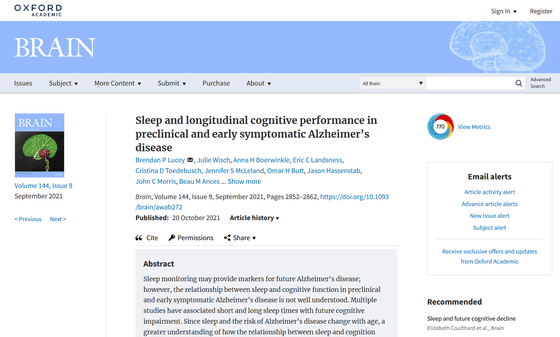More than 6.5 hours of sleep per day can lead to cognitive decline

Quality Sleep Sleep not only promotes body repair and improves mental health, but also reduces the risk of many illnesses, including heart disease and diabetes. It is also known that lack of adequate sleep can lead to cognitive decline and risk of Alzheimer's disease. However, a research team at the University of Washington School of Medicine published a paper stating that 'sleeping too long can also lead to cognitive decline, and sleeping is not always as good as sleeping.'
Sleep and longitudinal cognitive performance in preclinical and early symptomatic Alzheimer's disease | Brain | Oxford Academic
https://academic.oup.com/brain/article-abstract/144/9/2852/6401973

Sleeping longer than 6.5 hours a night associated with cognitive decline according to research – what's really going on here?
https://theconversation.com/sleeping-longer-than-6-5-hours-a-night-associated-with-cognitive-decline-according-to-research-whats-really-going-on-here-170989
The research team conducted a four- to five-year follow-up study of 100 elderly people with an average age of mid-to-late 70s. At the time of the survey, 88 out of 100 had no signs of dementia and 12 had signs of dementia. During the study, participants underwent general cognitive function tests and neuropsychological tests to look for signs of cognitive decline and dementia. The results of these tests were summarized in the PACC (Preclinical Alzheimer Cognitive Composite) score, which is a complex cognitive function scale. The higher this PACC score, the higher the cognitive function.
Sleep was measured over 4-6 days using a single-electrode electroencephalograph worn on the forehead when sleeping. With this EEG measurement, you can accurately measure the activity of the brain, and you can know the presence or absence (time) of sleep and the degree of sleep. Researchers also investigated other factors that affect cognitive decline, such as age, heredity, and the presence or absence of amyloid β and tau protein associated with dementia.
The results showed that cognitive function declined over time when sleeping less than 4.5 hours and more than 6.5 hours a day. Interestingly, the effect of sleep time on cognitive function was similar to the effect of age, which is the greatest risk factor for cognitive decline. Previous studies have stated that the healthiest sleep time is '7-8 hours', but this study found that 'suitable sleep time for maintaining cognitive function is 4.5-6.5 hours'. is showing.

Previous studies have shown that lack of sleep leads to cognitive decline. For example, a study published in 2017 showed that people who reported sleep disorders such as insomnia and excessive daytime sleepiness were at higher risk of developing dementia than those who did not. .. A study published in 2013 also found that the brains of people with short sleep times tend to have high levels of amyloid β, similar to patients with Alzheimer's disease.
It is not clear why sleep deprivation leads to cognitive decline. According to one theory, sleep helps eliminate harmful proteins that accumulate during the day from the brain. Some of these proteins, such as amyloid β and tau protein, are thought to cause dementia. This means that disturbed sleep can impair the ability of the brain to remove these proteins. Experimental results published in 2018 show that even a single night's sleep deprivation causes a temporary increase in amyloid β levels.

Previous studies have also shown a link between hypersomnia and cognitive function, but many use brain waves to stimulate brain activity because sleep time recordings are based on subject self-reports. The data is less accurate than it is measured. The paper published this time by a research team at the University of Washington School of Medicine supports these findings.
Related Posts:
in Science, Posted by log1i_yk







